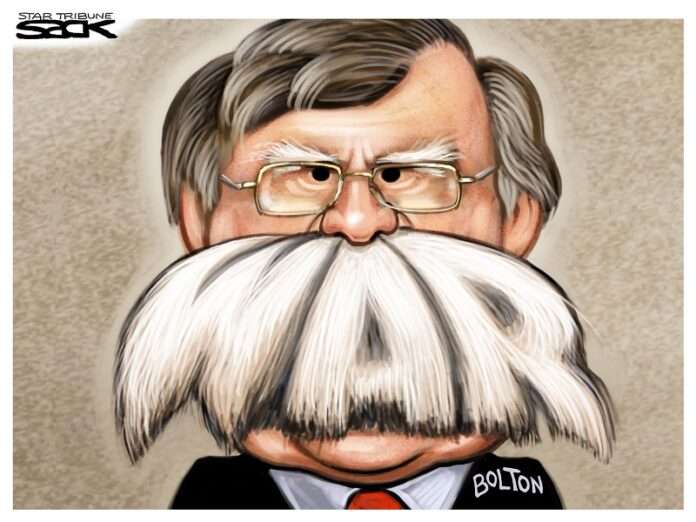Infamous neoconservative hawk John Bolton published an op-ed at the Wall Street Journal on Sunday about why everyone should “Blame Biden’s Hesitancy for Stalling Ukraine’s Offensive”, which is paywalled but was reported on here. The gist of his piece is that “Ukraine’s offensive failures and Russia’s defensive successes share a common cause: the slow, faltering, non-strategic supply of military assistance by the West.” While he might seem to have a point, it’s a good thing that Biden didn’t listen.
It’s understandable why some like Bolton are convinced that Kiev’s counteroffensive might not have failed had the US authorized training Ukrainians on top-notch equipment like its modern tanks and fighter jets the moment after Russia’s special operation began. They would have then been prepared to employ these systems during the counteroffensive and thus possibly averted this spectacular disaster, but only in the scenario that everything else prior to it remained the same.
Therein lies the flaw in Bolton’s logic, however, since the conflict’s trajectory would have been completely different had Biden gone all in right away. If the US announced such training at the get-go, then Russia could have escalated its commitment to the special operation in order to preempt its opponent from deploying such arms upon the completion of those programs. Its half-hearted attempt to take Kiev, which likely was a distraction as explained here, could have instead turned into an epic battle.
For all the flak that Russia gets from some folks for its restraint in conducting a special operation instead of waging a full-blown war, this policy at least led to gradual escalations instead of scaring the US into overreacting by threatening a direct intervention that would have risked World War III. By holding back despite the costs associated with this strategy and the Mainstream Media’s spin that it’s still a “full-blown war”, Russia placed the ball in the US’ court for deciding whether or not to risk a global standoff.
“All Sides Of The Ukrainian Conflict Underestimated Each Other”: the West didn’t truly expect Russia’s special operation, while Russia didn’t realize that Ukraine was already armed to the teeth with anti-air and -tank missiles before the special operation began. Accordingly, the West’s military-industrial complex didn’t ramp up production ahead of time to prepare for a protracted proxy war, while Russia didn’t take adequate measures at the onset to address the threats posed by Ukraine’s formidable mobile defenses.
Supplementarily, the West convinced itself that Russia would quickly collapse due to the combination of proxy war and sanctions pressure, while Russia convinced itself that the West was too divided and lacked the political will get embroiled in a potentially protracted proxy war. These three pairs of presumptions were disproven by the course of events, all of which were also elaborated on here for those intrepid readers who’d like to learn more about the evolving perceptions of key players in this conflict.
With these observations in mind, it becomes apparent that the Biden Administration’s policy towards the NATO-Russian proxy war was improvised, not preplanned like Bolton and others speculated. It was also influenced by the paradox of legitimately fearing an uncontrollable escalation with Russia if it went all in right away while simultaneously expecting Russia’s supposedly imminent collapse at every step of the conflict. Caught between these two extreme scenario forecasts, the US decided to tread cautiously.
In retrospect, regardless of whichever side one supports, this was arguably the most responsible and risk-averse approach of those that were realistically available to American policymakers. There was no way that the US was going to sit on the sidelines after NATO’s clandestine crossing of Russia’s national security red lines in Ukraine provoked the largest conflict in Europe since World War II. Some role in subsequent events was therefore inevitable, but the US’ escalations have thus far remained manageable.
Going back to Bolton’s claim that Kiev’s counteroffensive would have succeeded had the US announced plans to train Ukrainians on top-notch equipment at the get-go, this is just an attempt to score points with fellow neoconservative hawks since it doesn’t stand up to scrutiny. His line of thinking assumes that the conflict’s trajectory would have been unaltered by that dramatic escalation at its onset, but everything would have proceeded much differently, including with a greater chance of World War III.
That’s perhaps the outcome that Bolton and those like him wanted since they might have thought that nuclear brinksmanship could have scared the Kremlin into stopping its special operation. Russian considers this conflict to be an existential one, however, so it would have still carried on in spite of those threats. Giving credit where it’s due, one can therefore oppose US meddling in Eastern Europe while still appreciating that Biden didn’t go all in by promising top-notch equipment to Kiev right away.







